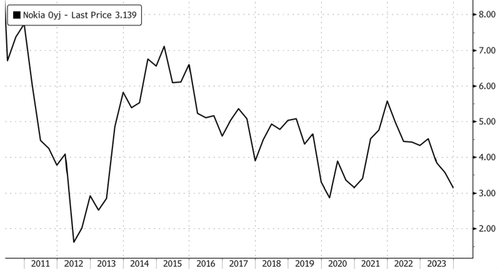
Telecom giant Nokia announced as many as 14,000, or roughly 16% of its workforce, will be laid off, warning the "timing of the market recovery is uncertain" after weaker demand for 5G equipment.
Bloomberg data shows Nokia employs 86,000 people. The telecom said a "reset" is needed "to reduce its cost base and increase operational efficiency while protecting its R&D capacity and commitment to technology leadership." It plans to lower its costs by between 800 million euros and 1.2 billion euros by the end of 2026, adding, "This represents a 10–15% reduction in personnel expenses."
The massive headcount reduction comes after Nokia reported third-quarter net sales plunged 20% year-on-year to 4.98 billion euros. Profits crashed by as much as 69% year-on-year to 133 million euros from July through September, compared with last year.
"In the face of a challenging market environment, we will reduce our cost base to protect our profitability," Nokia's chief executive, Pekka Lundmark, said in a video statement.
Lundmark said it's "impossible to say" how long the downturn in network markets will last, adding on a long-term basis, investments in 5G will be "necessary" to handle surging data traffic due to artificial intelligence and cloud computing.
He did not rule out the possibility of "structural moves" beyond cost-cutting measures. He emphasized that even when considering substantial headcount reductions, Nokia's primary goal remains safeguarding its ability to maintain strong R&D output.
The CEO acknowledged that the macroeconomic environment will play a significant role in 2024. However, he stated it was too early to provide specific guidance and cautioned against assuming the company would receive support from the market.
Regarding regional insights, the CEO observed a notable slowdown in India in the second half, suggesting a normalization trend compared to the year's first half.
After earnings, Lundmark told Bloomberg, "Operators have found it challenging to monetize their 5G investments."
Growth in the India market "is no anymore able to compensate fully for what we are losing in North America," Lundmark said. "But what comes down, will go back up again and we do not know what the timing is. That's why we are taking action."
Shares of Nokia in Europe fell 3.5%, nearing lows not seen since the early days of Covid.
Nokia isn't the only Western telecom reducing its workforce: Sweden's Ericsson announced plans to reduce its headcount by 8,500 earlier this year. The slowing global economy and elevated inflation have pressured telecoms.
On Wednesday, Ericsson CEO Borje Ekholm warned: "Underlying uncertainty impacting" its mobile networks will last into 2024, causing doubts over recovery for telecommunications equipment makers.
Telecom giant Nokia announced as many as 14,000, or roughly 16% of its workforce, will be laid off, warning the “timing of the market recovery is uncertain” after weaker demand for 5G equipment.
Bloomberg data shows Nokia employs 86,000 people. The telecom said a “reset” is needed “to reduce its cost base and increase operational efficiency while protecting its R&D capacity and commitment to technology leadership.” It plans to lower its costs by between 800 million euros and 1.2 billion euros by the end of 2026, adding, “This represents a 10–15% reduction in personnel expenses.”
The massive headcount reduction comes after Nokia reported third-quarter net sales plunged 20% year-on-year to 4.98 billion euros. Profits crashed by as much as 69% year-on-year to 133 million euros from July through September, compared with last year.
“In the face of a challenging market environment, we will reduce our cost base to protect our profitability,” Nokia’s chief executive, Pekka Lundmark, said in a video statement.
Lundmark said it’s “impossible to say” how long the downturn in network markets will last, adding on a long-term basis, investments in 5G will be “necessary” to handle surging data traffic due to artificial intelligence and cloud computing.
He did not rule out the possibility of “structural moves” beyond cost-cutting measures. He emphasized that even when considering substantial headcount reductions, Nokia’s primary goal remains safeguarding its ability to maintain strong R&D output.
The CEO acknowledged that the macroeconomic environment will play a significant role in 2024. However, he stated it was too early to provide specific guidance and cautioned against assuming the company would receive support from the market.
Regarding regional insights, the CEO observed a notable slowdown in India in the second half, suggesting a normalization trend compared to the year’s first half.
After earnings, Lundmark told Bloomberg, “Operators have found it challenging to monetize their 5G investments.”
Growth in the India market “is no anymore able to compensate fully for what we are losing in North America,” Lundmark said. “But what comes down, will go back up again and we do not know what the timing is. That’s why we are taking action.”
Shares of Nokia in Europe fell 3.5%, nearing lows not seen since the early days of Covid.
Nokia isn’t the only Western telecom reducing its workforce: Sweden’s Ericsson announced plans to reduce its headcount by 8,500 earlier this year. The slowing global economy and elevated inflation have pressured telecoms.
On Wednesday, Ericsson CEO Borje Ekholm warned: “Underlying uncertainty impacting” its mobile networks will last into 2024, causing doubts over recovery for telecommunications equipment makers.
Loading…






